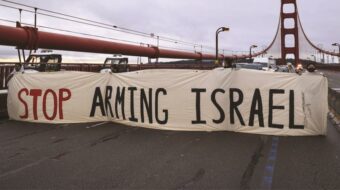As the war in Libya continues, observers are foreseeing protracted, bloody conflict with considerable loss of life. While the rebel forces appear strongly supported in the Eastern part of the country, the Gadaffi regime seems to have support in the Western portion. There is also a mounting refugee crisis as Libyan citizens and many non-Libyan workers in the country’s oil and gas industry are fleeing for their lives.
The two European NATO countries which have spearheaded the intervention in Libya, the United Kingdom and France, are calling for an intensification of the intervention.
A stalemate and a continuing civil war are not in the interests of the people of Libya. Therefore we should pay serious attention to attempts at mediation and a cease-fire.
From the beginning, a number of countries and blocs have called for precisely this. These include the ALBA (Bolivarian Alliance for the People of Our America) group of Latin American and Caribbean states, and also Brazil, Indonesia and Vietnam.
The African Union (AU), after being blocked by NATO bombing for a while, was able to get a delegation composed of the presidents of South Africa, Mauritania, Mali and the Republic of the Congo (Brazzaville) and the foreign minister of Uganda into Libya last weekend.
Our corporate-controlled press immediately belittled this delegation, pointing out that many of the African Union countries are not exactly paragons of democracy, and that the African Union and several of its component countries are deeply beholden to Gadaffi for economic support. However, the strongest figure in the delegation is South African President Jacob Zuma, whose government voted for the UN resolution enabling the no-fly zone, and has clashed with Gadaffi on other issues. So to represent the AU delegation as mere Gadaffi puppets is not correct.
The government in Tripoli reacted positively to the AU initiative but the rebel leadership in Benghazi on Monday rejected it because it does not call for the immediate removal of Gadaffi, his sons and his close associates.
Now the five countries called the “BRICS” (Brazil, Russia, India, China and South Africa), meeting in China, have come out in favor of a negotiated, peaceful settlement in Libya.
The total population of the BRICS countries and others who have stepped in to call for a cease-fire and negotiations amounts to nearly half of the population of the planet. The BRICS countries are also a rising force in the world, economically and diplomatically.
Imperialist leaders have taken the position that NATO (North Atlantic Treaty Organization) as an “international organization” gives legitimacy to whatever they do in Libya. Nothing could be further from the truth. NATO is not an “international organization.” It was founded after the Second World War as an anti-communist military alliance. Under this cover, NATO, with its Operation Gladio “stay behind” organizations, has a sinister history of intervening in the internal affairs of European countries. This includes organizing terrorism in Italy (killing scores of innocent people) so as to be able to blame it on communists, and supporting the vicious dictatorship of the colonels in Greece from 1967 to 1974. Since the collapse of Soviet and Eastern European socialism, NATO has greatly expanded its role, intervening in the civil wars in the former Yugoslavia and now operating in Afghanistan. At its meeting in Lisbon, Portugal, late last year, NATO made it clear that the “North Atlantic” for its purposes now includes just about the whole planet.
The United States is still the strongest state within NATO, but the leaders of other major NATO countries have their own imperialist agendas, which are becoming very visible as France and Britain push for escalation of the Libya war. Back in the 1960s, France (under de Gaulle) pulled out of the NATO command structure, partly because of the perception that it was dominated by the U.S. and Britain, but also because NATO at that time refused to help with France’s troubles in Algeria. In 2008, the current French president, Nicolas Sarkozy, re-inserted the French armed forces into the NATO command structure. This coincides with increased French interventionism, from West Africa to Haiti. Could it be that Sarkozy now sees NATO as a useful mechanism for advancing the interests of French imperialism?
The interests of the NATO governments are those of their own ruling classes, not of the Libyan people. These ruling class interests include control over Libya’s oil, gas and underground water resources, as well as geopolitical influence in an important area of the world which appears to be slipping out of imperialism’s grasp.
Therefore progressive people in the United States should support any efforts of third parties to promote a peaceful solution to the growing Libya stalemate.












Comments